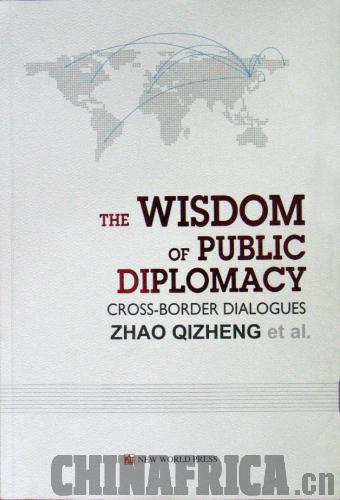| 
Although public diplomacy is not a new term in political and academic circles, it may still sound abstract and alien to the general public. Discussion of public diplomacy is often confined to serious seminars and academic publications. Published by New World Press in April this year, The Wisdom of Public Diplomacy: Cross-Border Dialogues is presented in the form of dialogues on topics in public diplomacy. The book does away with most esoteric jargon and provides a clear window for professionals and lay readers alike to gain a solid understanding of public diplomacy discourse.
The book consists of the dialogues between Zhao Qizheng, Vice Chairman of the Foreign Affairs Committee of the Chinese People's Political Consultative Conference (CPPCC), and foreign interlocutors: mostly statesmen, senior journalists, scholars and people engaged in public diplomacy, including highly respected names like Henry Kissinger and Richard Lugar.
In 1965, Edmund Gullion, an American career diplomat, first used the term "public diplomacy." To this day, however, there is no universally accepted definition of the term in the academic world. In general, public diplomacy is employed by a country to promote its image or reputation in the public of foreign countries. Voice of America (VOA) serves as a classic example of American public diplomacy, and aims to present the country's values and ideals to the rest of the world.
Public diplomacy is essentially the informal conversation between different cultures. As Zhao Qizheng, the author, puts it: "A lack of such dialogue will inevitably lead to misunderstandings and even conflicts." With the globalization gaining momentum in recent decades, all countries in the world have become more interdependent than ever, and public diplomacy has become increasingly importnat.
In 1999, the United States set up a new leadership post, the Under Secretary of State for Public Diplomacy and Public Affairs. In May 2010, China's Ministry of Foreign Affairs also established a public diplomacy office. Although China has been active in public diplomacy in recent years, on the whole, it still lags far behind countries like the United States in public diplomacy reach and expertise.
The inevitable consequences of poor public diplomacy efforts have led to limited understanding and even distorted perceptions of China overseas. There is a tendency in the country to assume that economic growth guarantees a good national image. This view is misguided, and public diplomacy is still essential.
In the dialogues between Zhao and his American interlocutors like Henry Kissinger, former U.S. Secretary of State, Paul Foldi, a senior consultant working in American public diplomacy, and senior reporters and editors from The New York Times, the reasons behind some Westerners' negative attitudes toward China are discussed in detail. Ideological barriers, China's lackluster public diplomacy, the role of media, and different political systems between China and the Western countries are all mentioned as contributors to China's image.
To present China to the world in an effective and engaging manner, Chinese media should play a vital role. As Zhao points out, however, China's newspapers, magazines and media representatives are not good at telling the "China story." They get carried away with jargon and clichés, and some outlets fall back on government report-style language instead of adopting a lighter, more amiable tone. This opens a cultural gap – to overseas readers, who are used to a more lively press style, such media conventions seems alien. Too often, Western commentators take the easy way out: Chinese media outlets are mere mouthpieces of the government, they say, and this gives them the excuse they need to reject any and all printed commentary from China.
The author points out that in Western countries, there are ideological influences in media. American reporters tend to look for and focus on conflict, as mentioned by Nicholas D. Kristof, a senior journalist at The New York Times. When conflict is absent, they dig deeper until they can find something they can present as conflict. This mentality has affected America's coverage of China.
Zhao emphasizes the role of people-to-people communication in effective public diplomacy. He divides public diplomacy into traditional and modern schools of thought. Traditional public diplomacy refers to the efforts or investments made by a country's government to influence the public of other countries. In modern public diplomacy, the public participates. They have easy access to channels for expressing their opinions and can pay closer attention to "how their own countries' international reputation influences their personal interests."
China has been actively engaging in public diplomacy activities in recent years, as cogently illustrated by the 2008 Beijing Olympic Games and the 2010 Shanghai World Expo. But there is still a long way to go before its public diplomacy efforts can be regarded as far-reaching, mature and influential. |